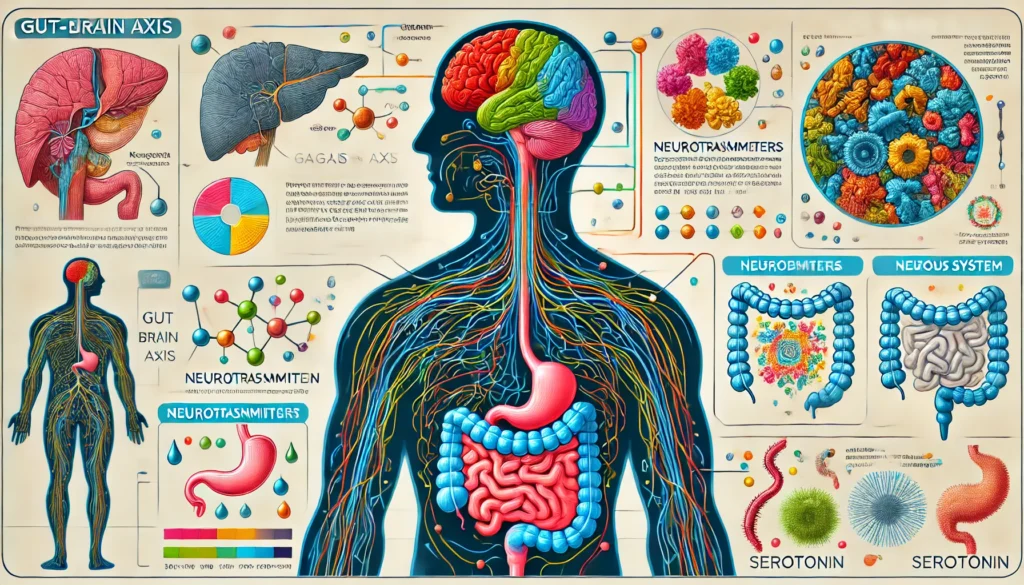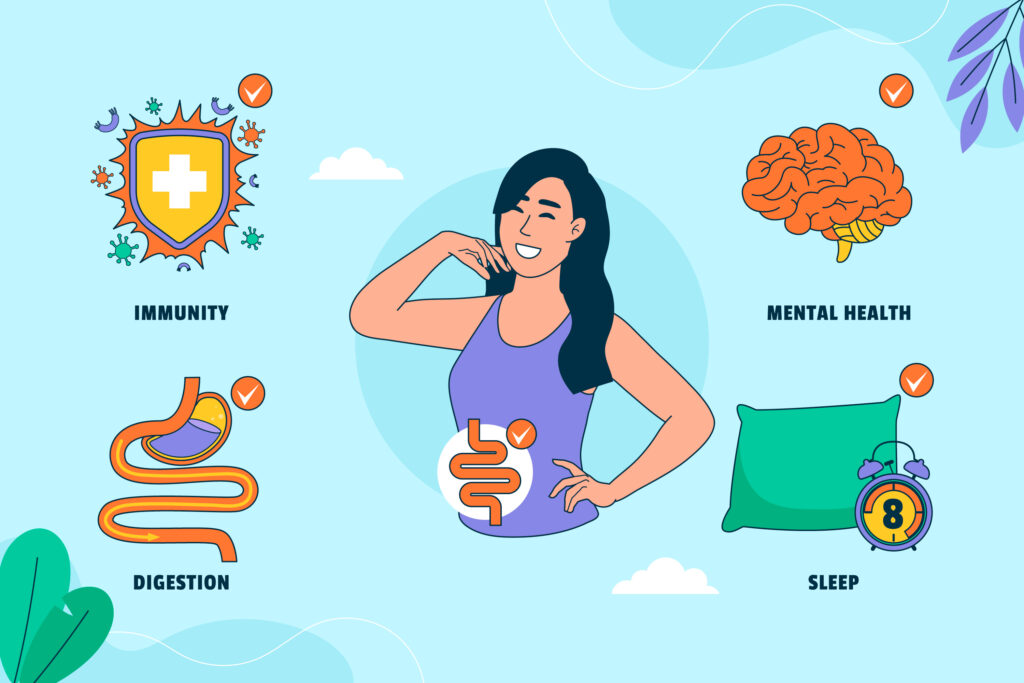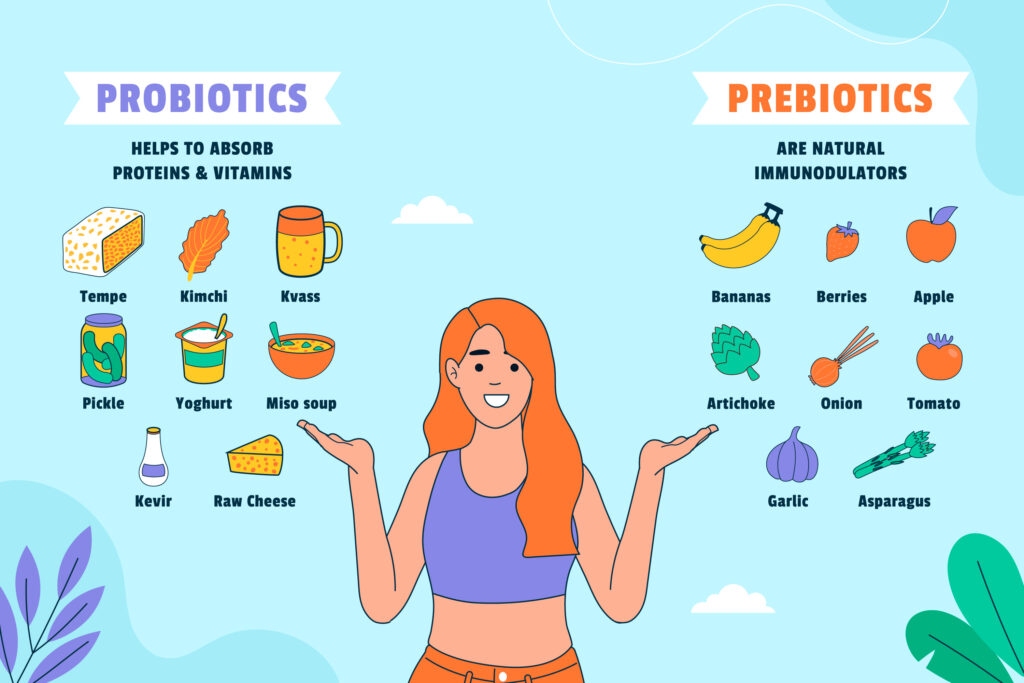
Table of Contents
Introduction
Personal development means being mindful, productive, and emotionally resilient. But equally important but overlooked is the way our gut connects to our brain. This so-called gut-brain axis refers to a two-way communication system that shapes your mental clarity, mood, and wellness. As you can imagine, understanding and optimizing this connection between the gut and the brain can help unlock the full potential of your mind and body.
The blog looks into the complexities of gut health, the science behind nutritional psychiatry, and the transformative potential of psychobiotics and probiotics in mental well-being. We’ll trace the role of serotonin in gut production and how being invested in nurturing a healthy gut microbiome can help one achieve the epitome of brain power.
1. The Gut-Brain Axis: Symphony of Connection
The gut-brain axis refers to the complex inter-network of communication between the central nervous system, that is the central and the spinal cord and the enteric nervous system, the neural network of the gut. This connection is mediated by:
Neurons: It contains about 100 million neurons, referred to commonly as the “second brain.”
Neurotransmitters: The gut produces serotonin, dopamine, and gamma-aminobutyric acid (GABA), influencing mood and emotions.
Microbiota: Billions of bacteria, fungi, and viruses in the gut play a critical role in communication with the brain.
Disruption of this system can result in mental health issues, including anxiety and depression.
2. Gut Health Link to Mental Well-being

A healthy gut microbiome promotes brain health in a variety of ways.
Gut Mood Regulation: The gut produces up to 90 percent of the body’s serotonin, the “feel-good” neurotransmitter.
Balanced Gut Stress: Modulate cortisol effect of chronic stress.
Cognitive Function: Research has shown that a diverse gut microbiota enhances memory and learning.
If the gut health is disturbed, inflammation leads to “brain fog,” anxiety, and even neurodegenerative diseases.
3. Nutritional Psychiatry: Food as Medicine
Nutritional psychiatry is one new strategy that puts much attention on diet in mental health. Research has already proven certain nutrients and food consume disturbances through the gut-brain axis:
Fermented Foods: Yogurt, kimchi, and kefir- are excellent sources for probiotics, which help replace friendly bacteria within the gut.
Omega-3 Fatty Acids: This is found in fish, flaxseeds, and walnuts which reduce inflammation within the gut and can improve brain function.
Polyphenols: Berry, green tea, and dark chocolate components induce healthy gut bacteria.
Fiber: Whole grains, fruits, and vegetables are prebiotics that feed the gut microbiota.
Epidemiological studies of such dietary patterns have correlated them with reduced prevalence rates for depression, anxiety, and cognitive decline.
4. Psychobiotics: The New Frontier in Mental Health
Psychobiotics are strains of probiotics that may influence the central nervous system by translocating from the gut to the brain or other end points of the gut–brain axis. Examples include:
Bifidobacterium longum: Reduced anxiety and stress.
Lactobacillus helveticus: Mood improvement and reduced symptoms of depression
Lactobacillus rhamnosus: Enhances the resilience or stress
These “mind-friendly microbes” change how we look at mental health. These bacteria provide an alternative in the natural direction and even a potential supplement to psychotropic drugs.
5. Serotonin Levels in the Gut: The “Happiness Hormone
One of the most intriguing aspects about gut health is that it is a serotonin producer. Serotonin is the natural neurotransmitter controlling mood, sleep, and appetite, and its deficiency has been linked to depression.
95% of serotonin is produced in the gut.
Serotonin production is controlled by the gut microbiome through the fermentation of dietary fibers and amino acids, such as tryptophan.
Eggs, nuts, and bananas elevate the levels of tryptophan thereby aiding serotonin to build up.
In the case of an inflamed or imbalanced gut, serotonin levels can plummet significantly, resulting in emotional dysregulation.
6. Probiotics and Mental Health: The Evidence
Huge numbers of studies confirm the contribution of probiotics to mental health:

A 2019 study published in Frontiers in Psychiatry demonstrated that subjects who received probiotics reported a reduction in symptoms of depression.
Probiotics are also linked with improved sleep quality to support cognitive functioning according to several studies.
How to Incorporate Probiotics into Your Life
Select fermented foods or high-quality probiotic supplements.
Strain variety is best for maximizing benefits.
7. Effect of Stress on Gut Health
Stress dramatically alters gut health and disrupts a certain balance in the microbiota population.
Cortisol: Chronic stress raises the levels of cortisol, damaging the lining of the gut.
Dysbiosis: Stress can cause an overabundance of noxious bacteria, which enhances inflammation.
Leaky Gut: Stress caused inflammation brings holes within the gut lining, where toxins move into the blood and become problematic for the brain.
Mindfulness in meditation, yoga, and deep breathers helps keep low stress levels and regain a healthy gut.
8. Creating A Pro-Gut Lifestyle
Create this habits to foster your gut-brain axis:
Eat a diverse diet: Increase your intake of varied plant-based foods to create optimal amounts of microbial diversity.
Limit Processed Foods: Reduce sugar and artificial additives, which may harm the microbiota.
Hydrate: Sufficient water intake supports digestion and nutrient uptake.
Exercise: Physical activity increases diversity in gut microbiota.
Sleep: Quality sleep is vital for gut health and brain function.
Avoid Antibiotics Unless Necessary: Overuse leads to depletions in beneficial bacteria.
9. Real-Life Success Stories
Tens of thousands have changed their lives and made gut health a priority:
Jane’s Story: For years, Jane struggled with depression. She began to eat a gut-friendly diet. Within months she felt improved mood and mental clarity.
Mark’s Story: Mark experienced chronic stress. Psychobiotics, combined with mindfulness, resulted in severe anxiety decrease.
These stories illustrate the gut-brain connection: enhancement of total well-being.
10. Gut Health and Mental Wellness into the Future
Emerging science uncovers profound connections between gut health and brain power. Advances in psychobiotics and personalized nutrition promise exciting possibilities for mental health interventions.
With science, a message is clear: caring for your gut is not just about digestion; it’s a cornerstone of mental resilience and cognitive excellence.
11. Create a Probiotic and Prebiotic Meal Plan
Building a balanced diet that focuses on gut-friendly foods can be overwhelming. It’s best to start with small steps.
Probiotic Foods
Probiotics are favorable bacteria that help rectify the imbalance of gut microbiota. Incorporate these into your diet:
Yogurt: Opt for unsweetened, live-culture types.
Kimchi and Sauerkraut: These fermented vegetables add tangy flavors and healthy microbes.
Kefir: A fermented dairy drink, high in probiotics and calcium.
Tempeh: A soy product that is high in protein and also supports gut health.
Prebiotic-Rich Foods
Prebiotics are fiber that feed your gut bacteria. Add to your diet:
Bananas: Such a versatile fruit, especially when a little green
Garlic and Onions: Savory flavorings that are, themselves, powerful prebiotics
Oats: Good breakfast food to feed the gut
Chicory Root: Sometimes used as a coffee substitute due to high inulin, a prebiotic fiber
Combine probiotics with prebiotics in foods that feed each other, such as yogurt with bananas or stir-fried tempeh with garlic and onions.
12. Incorporate Psychobiotics into Your Routine
Whereas probiotics are generally beneficial for gut health, psychobiotics are targeted specific strains for mental health. Here’s the intake of them:
Supplements: Adopt a high-quality psychobiotic supplement supplement after consulting with your healthcare provider. Find Bifidobacterium longum or Lactobacillus rhamnosus.
Daily Habits: Take psychobiotics at the same time each day, preferably with the meals for better absorption.
Track Advantages: Utilize a journal to keep tabs on mood, concentration, and overall condition of well-being in order to determine the effect.
13. Engage in Mind Mapping to Organize Your Gut Health Goals
Mind mapping can provide a good method to organize your plan for improved gut health. From a main concept, “Gut-Brain Health,” branch out into action items:
Eat: What is one thing that can you implement immediately?
Move: How can you increase activity that helps the gut?
Stress Management: What relaxation techniques work for you?
Visualization Approach
This visual approach translates complicated objectives into doable actions to make a flow of progress.
14. Inhale Relaxation Techniques for Gut-Brain Harmony
Stress can be disastrous for the gut-brain axis, but relaxation practices can counteract that:
Meditate: Take 10-15 minutes daily to focus on your breathing to soothe the mind and gut.
Yoga: Child pose and twists activate digestion and lower cortisol levels.
Progressive Muscle Relaxation: This technique reduces physical tension that impacts gut well-being.
Consistency is the key. These practices will improve your mental wellness and nurture a healthier gut.
15. Tap into the Force of Movement
Exercise is one critical feature of healthy guts and healthy brains. Here’s how movement works:
Promotes Greater Gut Microbiota Diversity: Exercise encourages a more diverse community of beneficial bacteria.
Boosts Brain-Derived Neurotrophic Factor (BDNF): Physical activity enhances BDNF, which supports brain function and mood regulation.
Aids Digestion: Gentle movement, such as walking after meals, supports gut motility.
Start with enjoyable activities like dancing, hiking, or swimming to build consistency.
16. Monitor Your Progress with Journaling
Tracking your journey is essential for long-term success. Maintain a journal to record:
Foods consumed and their effects on mood and energy.
Change in digestion or clear thinking after probiotics or psychobiotics introduction
Stress levels and sleep quality over the period
It is awareness that increases as you observe visible changes.
17. Challenges of Change

Challenge 1: Ignorance
People fail to recognize gut-friendly food or behaviors. Solution: Begin with one or two dietary changes and learn from credible books or podcasts related to gut health.
Challenge 2: Constraint of Time
A hectic schedule leaves little time to prepare gut-friendly meals. Solution: Meal prep on weekends and keep on hand snacks like yogurt, nuts, or fruits.
Challenge 3: Unpredictable Routines
Building new habits takes time. Solution: Habit trackers or set reminders may keep your probiotics and mindfulness practices on track.
18. Long-term Rewards of a Balanced Gut-Brain Connection
The payoff of that investment in gut health extends far beyond mental clarity:
Improved Emotional Resilience: A solid gut-brain axis reduces mood swings and encourages a more positive outlook.
Improved Productivity: Clarity of mind and energy shoot to sky-high levels, allowing a day-to-day focus in life.
Healthier Immunity: A great, healthy gut supports your immune system to reduce diseases.
Longevity: New research has revealed that a richer gut microbiota correlates with a longer and healthier life.
Thus, a healthy gut is one of the pillars for personal development and wellness.
19. Inspire the Future You
After all, change cannot come overnight. Progress may be slow but can be telling. Picture to yourself the person you want to be-mind sharp, emotions balanced, and practically thriving. Let this vision inspire you.
Conclusion: Take the First Step in Your Gut-Brain Transformation Today
The key to unlock your full potential is gut health, and brain power is the door that opens it up. Nutritional psychiatry, psychobiotics, an input of serotonin will totally change your well-being.
This is your journey to a healthier gut, a sharper mind, a marathon rather than a sprint. And you can begin today doing things that are small yet actionable. Consistency will bring you extraordinary changes in mood, mental clarity, and overall vitality.
Act now, and let your gut lead the way to a more empowered, vibrant, and fulfilled version of you.

